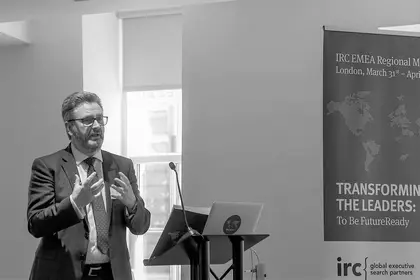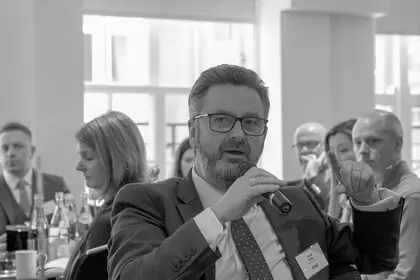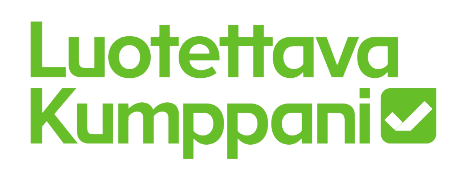Find out how the power of the individual – a beginner or an ‘old-hand’ – can transform a company; why personal development for leaders and employees alike is essential; how your staff can become ‘change agents ‘ to lead colleagues; why flexibility – both for you and your mission – is key; and discover why a former disc jockey and an international football star are icons of transformation.
If searching for someone who is the embodiment of his work, look no further than David Haley. When he left school in 1982, he did not go on to university. His mother had other plans. Convinced that nuclear conflict was imminent, she decided her son needed a skill that would secure his future in re-building the shattered post-war world. So, he became an apprentice electrician in his home city of Newcastle upon Tyne in the north east of England.
Happily, we’ll never know if the strategy would have worked. Not only did the planet avoid megaton melt-down but young David gave up being an electrician and embarked on a life and career of complete transformation. It’s a career that currently has him as Senior Vice President, UK & Ireland, of Atos which is – of course – a leading business transformation service provider.
As the keynote speaker at Kestria EMEA’s spring conference in London, David gave a vivid account not only of his own transformation but of the way in which businesses – and all who work in them - must transform and develop to survive. Relevance or irrelevance (or, at worst, extinction) is the choice facing companies in this new, digitally disrupted world, he said.
David Haley, Senior VP of Atos, at the Kestria EMEA Conference 2019
Today, this once trainee electrician, part-time disc jockey, lover of ‘80s music and a life-long fan of Newcastle United, one of England’s premier soccer clubs, heads a division of over 5,500 people in the British Isles with another 950 based in Poland and India. Last year his business billed £420m (Euro485m) and he expects 3%+ growth this year. He looks to expand soon into the US (and gave a gentle hint there of opportunities for the Kestria network).
“Digital technology, that’s what we do”, he said. “We deal with customers who fundamentally need to transform their businesses.” A long way on from the old image of ‘outsourcing’ – where a business simply needed to cut costs – business transformation is now an end-to-end process, as Haley describes it. Around 80% of his entire workforce has been acquired from client businesses moving to Atos.
Haley’s own career path is a model of what he now preaches. “Except,” he says, “I didn’t have a career until I joined BT (British Telecommunications) in the early ‘90s.” Once there he moved from system installation and servicing into a successful career in sales. He was involved in the opening of BT’s first contact centre in India and on 12th September 2001 (yes, the day after ‘9/11’) he was involved in the setting up – overnight – an operation in Boston to host call traffic diverted from the World Trade Centre (212 Conferencing). Openly admitting he had no career plan, he had a simple rule instead. “I took lots of different routes,” he reflected,” but I always said ‘yes! I’d like to do that, give that a go. I’d like to take that risk. What’s the worst that can happen? ‘ ”
Among clients in Atos, David lists delivery of foundation IT and results to the Olympic games family – “ we collect data; we leverage data for our clients” – the BBC, whose digital iPlayer tablet App is supported by Atos, and in David’s Atos Division (BTS) NS&I, Britain’s national savings bank. A little more than a decade ago a customer could deal with the ‘bank’ only by producing a cheque at a Post Office. Now Atos has transformed it into a 24/7 business with a complete digital footprint and the vast majority of NS&I employees transferring to Atos’s employment.
At this point, the story crosses from David’s own and those of businesses he’s helped transform to the workers within those companies. He is very clear individuals must transform themselves too, develop themselves because without that business transformation cannot happen.
In his own enterprise, all senior leaders are expected to have a sound grasp of new technologies and how they work and referred to his own familiarity with them. “If you want to know about SAP HANA [a database management system] or hybrid cloud then I’m your man… Well, let’s say I know enough,” he added with a smile.
He went on: “If you’re in business and you’re not relevant and you’re not able to have a conversation with colleagues or clients then very quickly you are irrelevant. And we can see that in businesses today; they’re finding themselves irrelevant.”
Thus David puts a premium on employee development. Employees transferring from other businesses are, occasionally, reluctant and ask how they can find the time in a busy day for the necessary training (Atos has partnered with Harvard University and their online business courses and Haley has undertaken a few). “But,” he asks, “what is the alternative? If you don’t train, you become irrelevant. You’re not looking after yourself in developing your career.”
In Atos, they have developed the ‘hands up’ method and now have a database of employees who have indicated (‘put up their hands’) they are keen to ‘upskill’. He cites a recent case: forty-five SAP engineers were needed for a job, and 43 came from internal candidates who had re-trained.
Those who ‘upskill’ become ‘influencers’ within a given business. David explains: “We’re trying to use those people who want to transition as ‘change agents’ to go back into existing teams to challenge some of thinking about the need to develop.”
When you know David Haley’s ‘back story’ you understand the high value he places on individuals of all ages, all backgrounds, all experience. He really does believe in finding ways in which everyone can develop and contribute.
In his own division, he has launched Explore and Expand academies. The first gives junior staff the chance to work across different projects, to explore the business and find solutions to various business challenges (‘enormously successful’, he says). The second, Expand, is for older employees. Typically these are people with 20 years’ service or more who are given the chance to apply their skills and experience across other areas.
David Haley cherishes experience. When his division acquired Aegon’s protection business in Lytham St Annes, Atos retained the staff and in 2019 Aegon’s pensions business moves to Atos and again Atos will retain staff and establish a Global Centre of Excellence in the Scottish capital which can now grow in size and handle other, similar business.
Experience, he recognises, is often a function of age and for David – still in his early 50s – age is no barrier. He proudly proclaims that 65% of his workforce are over 50 (and adds that 72% are women). He would worry, he says, “if someone thought because of their age they were not relevant enough for consideration for change.”
He described Atos taking over a former Royal Air Force base in the far north of Scotland. Atos retained the former RAF staff and created a cybersecurity apprentice academy on the site. The result was people of 50 years or more working with young apprentices. The outcome, Haley says, “was a phenomenal success.”
David Haley, Senior VP of Atos, at the Kestria EMEA Conference 2019
Diversity and inclusion are passions of David’s. His commitment goes as far as being the executive sponsor of the LGBT+ community in Atos as an Ally. There are a number of employee networks in the company including Atos Pride, Armed Forces (for those in the services looking to make the move into the commercial environment), the Aeon Network for cross-generational employees and the newly added Up-Load, designed to encourage digital learning and leverage the power of social networks rather than being afraid of them.
Living and working in a dynamic, disrupted, digital world means always being ready for anything and everything. Flexibility is, therefore, a key attribute in the story David Haley tells. He cites a review point in Atos’ own 3-year business plan. Having focused on ‘digital pillars’ – in other words the digital services they were selling – for the past few years, they realised that moving to market-led services and expertise was clearly what their clients were demanding. “Everything starts and ends with the client”. Atos has a rich legacy in infrastructure, application delivery and service. Moving with their clients into cyber, virtual and specialized worlds is now critical. Flexibility was paramount. Customers and markets were moving vertically and were uninterested in location. Their goal was to sell and offer services globally.
So, Atos’s approach shifted away from simply selling their vast array of technological solutions to making their clients ‘ market capable’ and asking ‘why’ they want to go through a transformation process. He says: “Every conversation with the client starts with ‘why’?” He continues: “Our clients are on transformational journeys. It’s not just about infrastructure, back office, IT and so on – but also looking to transition their people, their values, their vision, operations and global reach. We can’t do that just being focused on technology.”
Above all, David Haley believes in people and their potential. He believes in empowering his staff – to take decisions, to learn, to develop and progress. He believes in his own ‘gut feel’ – and encourages others to develop it, that instinct that will guide you. And leadership, in spite of what the manuals and even Google will tell you – if you search for a definition – is, he believes, a mentality.
And at the end of it all his belief in the combination of people and skill being the keys to transformation and how even one person can make a difference bring us back to St James’s Park, the home of David’s beloved Newcastle United Football Club where he has missed only a handful of ‘home’ games in over 30 years. In January his team signed Paraguayan international Miguel Almiron; the player’s arrival has transformed the squad. “ It has revitalised the team because,” he says, “ we brought in a top class individual.”
And there you have the compelling case for transformation from David Haley – quite possibly Atos’s answer to Miguel Almiron.




